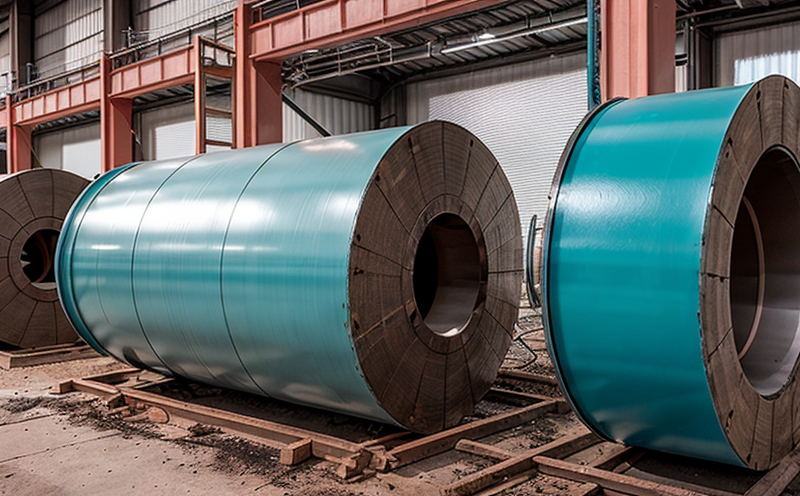ISO 20340 Offshore Structure Coating Corrosion Testing
The ISO 20340 standard is a critical tool for the testing and evaluation of coatings used in offshore structures. This comprehensive test ensures that the coatings applied to steel surfaces are capable of withstanding the harsh marine environment, which can lead to corrosion if not properly protected. The standard specifies procedures for exposing coated samples to a salt spray environment and measuring their resistance to corrosion.
Offshore structures such as oil rigs, platforms, and pipelines require robust protective coatings that can withstand extreme conditions including high humidity, exposure to corrosive chemicals, and fluctuating temperatures. The ISO 20340 test helps manufacturers and suppliers ensure the longevity of these structures by validating the effectiveness of their coating systems in real-world scenarios.
The testing process involves exposing coated specimens to a controlled salt spray environment for a specified duration. During this time, the corrosion resistance of the coating is assessed using various techniques such as weight loss measurements, visual inspection, and electrochemical tests like potentiodynamic polarization. The results are compared against acceptance criteria outlined in ISO 20340.
The standard provides detailed guidelines on sample preparation, test setup, exposure duration, and evaluation methods to ensure consistency and reliability across different laboratories. Compliance with this standard is essential for ensuring the integrity of offshore structures, reducing maintenance costs, and extending operational life. By adhering to ISO 20340, industries can demonstrate their commitment to quality and safety in marine environments.
This testing method plays a crucial role in the development and approval of new coating systems by providing data on performance under standardized conditions. It also helps regulatory bodies ensure that offshore structures meet stringent environmental standards.
Why It Matters
The durability and corrosion resistance of coatings applied to offshore structures are paramount for ensuring the safety, efficiency, and longevity of these critical assets. Offshore environments expose structures to aggressive elements such as saltwater, UV radiation, and varying temperatures, which can rapidly degrade unprotected steel surfaces. The ISO 20340 test is designed specifically to address these challenges by simulating real-world conditions in a controlled laboratory setting.
By subjecting coatings to the rigorous requirements of this standard, manufacturers and suppliers can verify that their products meet or exceed industry expectations for performance. This not only enhances the reputation of the product but also contributes to greater trust from end-users. Compliance with ISO 20340 is often a requirement in contracts and certifications, making it an essential part of quality assurance processes.
The results of this test are valuable not only for compliance purposes but also for R&D activities aimed at improving coating formulations. Engineers can use the data obtained from these tests to refine their products, ensuring better protection against corrosion. Additionally, testing according to ISO 20340 helps in identifying potential weaknesses early on, allowing for corrective measures before full-scale deployment.
In summary, adherence to this standard is crucial for maintaining high standards of quality and safety in the offshore industry. It provides a reliable method for assessing coating performance under harsh environmental conditions, thereby supporting sustainable practices within the sector.
Industry Applications
The ISO 20340 standard finds extensive application across various sectors where offshore structures play a vital role. Oil and gas companies rely heavily on this test to ensure that their platforms, pipelines, and storage facilities are protected against corrosion caused by saltwater exposure. Similarly, shipping industries benefit from accurate testing of coatings used in hulls and other critical components.
In addition to these major players, smaller contractors involved in marine construction also use ISO 20340 as part of their quality control measures. The standard ensures that all participants in the offshore ecosystem adhere to uniform standards, fostering a collaborative approach towards enhancing structural integrity.
The importance of this test extends beyond just manufacturing; it is equally significant for regulatory bodies overseeing compliance with environmental regulations. By endorsing products tested according to ISO 20340, these entities can promote safer and more sustainable practices within the industry.
Why Choose This Test
The ISO 20340 test offers several advantages over other methods of evaluating coating performance. One key benefit is its ability to simulate real-world conditions accurately, providing reliable data that can be directly applied to actual offshore structures. This makes it an invaluable tool for both research and development purposes.
Another advantage lies in the international recognition afforded by compliance with this standard. Many countries recognize ISO standards as authoritative references when establishing local regulations or guidelines. Therefore, choosing ISO 20340 ensures that your product meets global expectations without requiring additional certifications specific to individual markets.
The detailed nature of the test also allows for precise control over variables such as exposure time and salt concentration levels. This level of customization enables tailoring the testing process specifically to meet the unique requirements of different projects or materials being evaluated.
Lastly, but certainly not least, adherence to ISO 20340 demonstrates a commitment to excellence in product quality and reliability. It shows stakeholders that you are committed to maintaining high standards throughout every stage of production, from initial design through final application.





